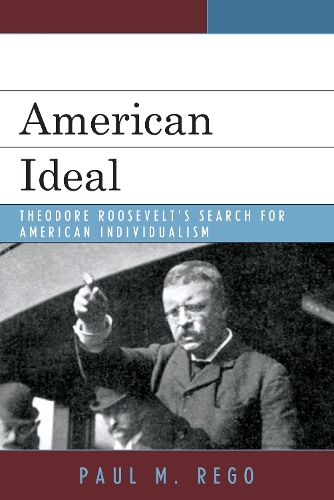
American Ideal: Theodore Roosevelt's Search for American Individualism
(Paperback)
Publishing Details
American Ideal: Theodore Roosevelt's Search for American Individualism
By (Author) Paul M. Rego
Bloomsbury Publishing PLC
Lexington Books
16th July 2009
United States
Classifications
General
Non Fiction
Political leaders and leadership
973.911
Physical Properties
Paperback
250
Width 155mm, Height 233mm, Spine 18mm
379g
Description
This book examines the political thought of Theodore Roosevelt, specifically his ceaseless desire and effort to reconcile America's individualistic tradition with the more collectivistic ideals of his Progressive brethren. Many scholars and lay-people alike cast Roosevelt as either "conservative" or "liberal," but his political thought defies so simple an interpretation; it was more nuanced and had a larger purpose than mere ideology. A thorough study of Roosevelt's writings reveals his conviction that the concepts of personal autonomy and civic concern were not mutually exclusive.
In fact, Roosevelt argued that it was because the principles of self-reliance and personal freedom were important that it was sometimes necessary for the entire community to use its collective powerand, in some cases, the institutions of the governmentto enable individuals to do what they could not do alone. Moreover, while Roosevelt advocated and was responsible for a great expansion in the regulatory powers of the national government, he understood, in contrast to many other Progressive reformers, that inspirational rhetoric and positive example could be as good as institutional reform and the force of law in compelling individuals to support one another in a spirit of civic attachment. In his public writings, Roosevelt sought to shape the American mind in ways that he thought proper. Even his writings on nature, hunting, ranching, and military life were part of his political thought in that they were intended to teach Americans about the importance of balancing those individualistic values that are healthy and vital to a society (discipline, personal responsibility, and a strong work ethic) with such positive collectivistic values as an appreciation for mutual support and a concern for the good of the community.
Reviews
Theodore Roosevelts dynamic mind opens a window into the soul of American Progressivism, and, likewise, Paul Regos constructive book opens a window into Roosevelts own mind. Like other Americans, Roosevelt struggled to reconcile the nations robust individualism with national purpose and unity. In this thoughtful and insightful book, Rego shows that, perhaps more than any other American, Roosevelt thought through the specific policies necessary for adapting government action to the purposes of national progress and individual character. -- David Robertson, professor of political science, University of Missouri-St. Louis
Rego offers 'an intellectual biography' of Theodore Roosevelt....A useful book....Recommended. General readers through researchers and faculty. * Choice Reviews *
[Henry] Pringle's well-written but venomous Theodore Roosevelt-published a decade after TR's death-set the tone for much of Roosevelt scholarship for a generation. Paul M. Rego does not make Pringle's mistake. He recognizes Roosevelt's complexity, and respects the power and breadth of his intellect. In short, he takes Theodore Roosevelt seriously, as both an accomplished statesman and as a serious political thinker. . . . He deftly demonstrates the power of Roosevelt's reconciliation of individualism with collective action, and traces the consistency of TR's thought from his early writings on history and nature to his mature statements during and after his presidency. . . . Anyone interested in TR, the presidency, American political thought, or American institutions will profit from this book. * Political Science Quarterly *
Americans have long admired Theodore Roosevelt as a man of action. In this new intellectual biography, Paul M. Rego shows the power of TRs thought. Rego convincingly demonstrates that TR developed the most impressive political diagnosis and constitutional theory written by any American statesman since Publius penned The Federalist. Well written, informative, and highly recommended. -- Jeffrey K. Tulis, associate professor, University of Texas at Austin
Author Bio
Paul M. Rego is assistant professor of politics at Messiah College in Pennsylvania.
